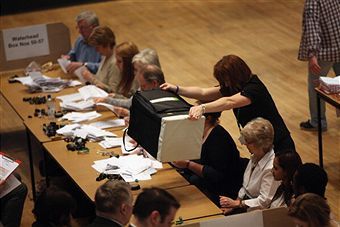 The referendum results haven’t even been announced yet, but the Yes
campaign’s myth-making machine is already in full swing. Within moments of the polls closing, Simon Hughes took to the airwaves to dismiss a No vote as a “hollow victory” because of
our “false facts and false figures”.
The referendum results haven’t even been announced yet, but the Yes
campaign’s myth-making machine is already in full swing. Within moments of the polls closing, Simon Hughes took to the airwaves to dismiss a No vote as a “hollow victory” because of
our “false facts and false figures”.
Just as some people on the left never came to terms with losing to Thatcher – blaming the SDP instead – Yes supporters are already peddling the idea that they only lost because the No campaign fought dirty.
So let’s set the record straight on the supposed ‘lies and distortions’ of the last few months:
We did not say the BNP would win seats under AV: The Yes campaign’s not-so-clever tactic has been to deny an accusation we never made. AV helps extremists because they would get more first preference votes – losing fewer deposits along the way – and get more influence over the final result, not because they would win more seats.
We did say AV elections would more expensive: The £250 million debate centred on whether AV would lead to the use of vote counting machines. The Yes campaign said it wouldn’t; we said it would. So did Anthony Mayer, former Chief Executive of the GLA, who ran London’s elections under AV. In his words, ‘with SV there is no choice but electronic counting’.
Britain’s previous experience with multi-round preferential voting systems is clear: it led to the introduction of electronic counting for elections in London and Scotland (with SV and STV respectively). As the head of Opt2vote, a vote counting machine manufacturer, put it:
‘[With AV] manual counts will inevitably take longer, more staff will be needed or the same staff used over a longer period increasing the risk of error, more demands for re-counts…a more efficient, quicker and accurate method of count is to perform it electronically’ .
We did say AV undermines the principle of One Person, One Vote: Under AV, some people get only a first preference counted, while other voters get a wider range of preferences counted. Regardless of semantic debates over the vote counting procedure, the final result under AV, quite simply, reflects an unequal expression of voters’ preferences.
The Yes campaign regularly and repeatedly made false claims: Although it doesn’t fit their ‘whiter than white’ self-image, the Yes team continually stated that the Conservatives use AV (they don’t); that AV would ensure candidates win with majority support (it wouldn’t); and that AV would get rid of safe seats (it wouldn’t).
Assuming pre-referendum polls prove accurate and the Yes campaign loses, they will have done so because they ran a poor campaign based on messages that most people don’t care about and celebrity endorsements people don’t believe. If we win, it’s because the Yes campaign never gave the general public a compelling reason to support AV.
Stabbed in the back-style myths are popular because they excuse losers from blame, and enable them to avoid the uncomfortable conclusion that their ideas are unpopular. But the truth is that voters weren’t hoodwinked by a duplicitous No campaign; they simply took a look at the change on offer and said No.






Comments